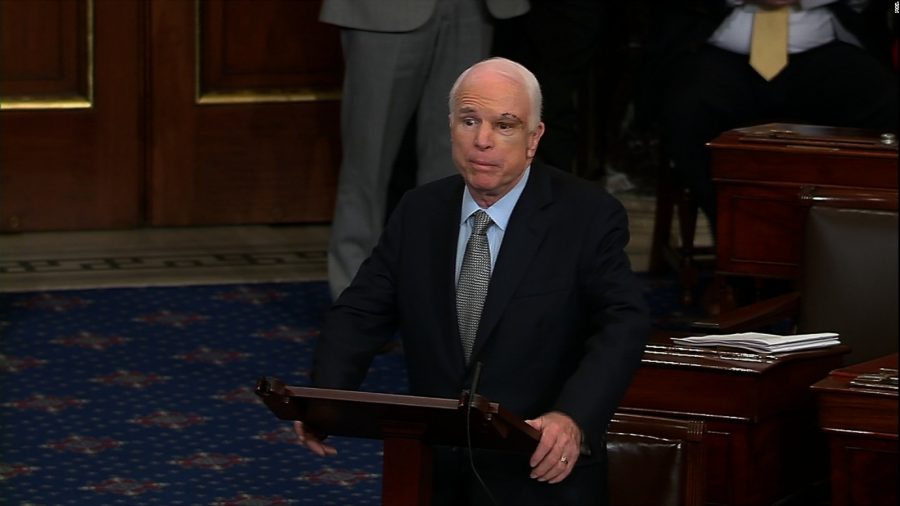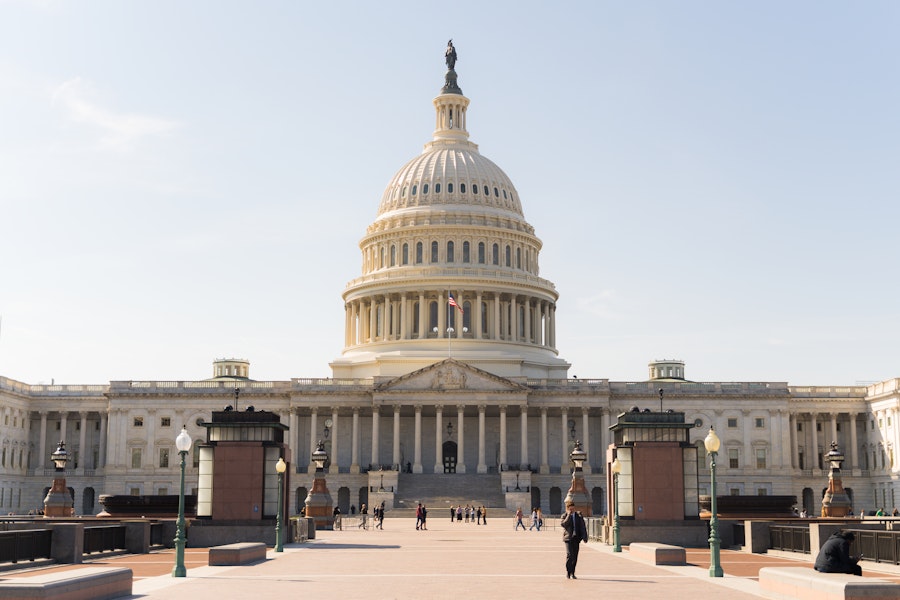Upon returning to the U.S. Senate following medical leave, Senator John McCain (R-AZ) gave a speech in July to much acclaim — from both Republicans and Democrats. In his speech, McCain called for the upper chamber of congress, once considered the “world’s greatest deliberative body,” to forget political differences and resume a bipartisan and cooperative legislative ethic.
McCain promoted the Senate’s (admittedly arcane) rules and customs, saying, “let’s return to regular.” It was time to hold hearings on bills, gather testimony, engage in intellectual debate, and — most importantly — compromise and cooperate for the good of the nation.
McCain’s speech came in the midst of a heated debate over the Senate Republicans’ plan to repeal the Affordable Care Act (ACA). But plans to repeal the individual and employer insurance mandates made the new bill highly unpopular among the American public.
Yet due to mounting pressures from President Trump and leaders in the House of Representatives to pass a health care reform bill following months of inaction, the majority tried to rush a bill through the Senate’s long legislative process. In doing so, they bypassed hearings on the bill’s effects, committee debates, and proper analysis from the Congressional Budget Office. When the bill was finally voted on, the Senate’s democratic minority had barely had time to read the bill, much less provide thoughtful compromises for the creation of a bipartisan bill.
This was not what Senator McCain had pleaded for in his speech just days earlier and was by no means a return to regular order, with Republican leadership employing every parliamentary trick available in their pursuit of the bill’s passage. Thus, in a late night vote on July 27, the bill was defeated by the narrow 51-49 margin helped on by the “No” votes of Senator McCain, Senator Lisa Murkowski (R-AK), and Senator Susan Collins (R-ME), handing the Democrats a rare and historic victory.
However, while pundits hailed McCain as a modern hero and predicted the return to common-sense, bipartisan legislating in the Senate, it was not to be. In fact, the problems described by McCain in his speech were only compounded by the increased pressure on Senate Republicans to have a legislative accomplishment under their belt by the end of the year.
That legislative accomplishment was to be the major tax overhaul promised by Republicans during the 2016 campaign cycle. And just they had done for their failed health care repeal attempt, the Republicans tried to ram their so-called Tax Cuts and Jobs Act, restricting testimony, rushing the bill out of committee, and blocking democratic input on the bill.
However, in the case of the Senate tax bill, the deviation from the regular order and thoughtful deliberation were far worse. The bill was not released until the evening of December 1, the same day the bill was to be voted on. In the meantime, the Congressional Budget Office and the Congressional Joint Committee on Taxation had no time to analyze the bill for its effects on the American economy while democratic Senators were left stranded. Indeed, congressional lobbyists received word of the proposed amendments to the US tax code before nearly half of the US Senate did. When the bill was finally released, its amendments had been illegibly scribbled by hand into the margins of the bill, rendering its amendments incomprehensible.
One would have expected McCain to again be a vanguard of the common-sense legislative process that made the Senate such an august body. Yet, in another late night vote, the bill was passed 51-49 with the only Republican opposition coming from Senator Bob Corker (R-TN).
The tax vote only proved that the Senate is headed further and further away from regular order. It showed us that instead of actually putting effort into discussing and deliberating important legislation and coming to bipartisan compromises on issues that affect millions of Americans, Republicans are content with stripping away all of the legislative processes that were put in place to ensure that the Senate is the more thoughtful and revered of the houses of Congress.
And yet this is by far not exclusively the habit of Republican Senators or leadership — the democratic leadership has, in the past, performed similar maneuvers to pass legislation. But this is an issue that affects us all and one that has major implications on American democracy. Here’s why deviation from the legislative norm actually matters:
For one, there’s the immediate considerations. One of the most important legislative tasks upcoming for the Senate is to approve a new budget for the coming fiscal year. Unlike the health care and tax bills, which only required 50 votes to pass, a bill to fund the government for the coming year requires 60 votes. With the Republicans holding only a slim 52-48 majority in the Senate, this means the majority will have to compromise with the democratic minority to prevent a government shutdown.
This should be a cause for concern for many Mason students whose parents work for various branches of the federal government. During the last government shutdown in 2013, which lasted for 16 days, 800,000 federal employees were furloughed while 1.3 million employees had to continue working without knowing their next payment dates. A failure to compromise with Democrats could prove extremely costly for the nation and Republicans in particular, as such a case would be the first shutdown in recent history with the entire federal government under the control of a single party.
And if Republicans continue to refuse to cooperate and compromise, choosing instead to rely on slim political majorities (in either the Senate or the House), their refusal to listen to the will of many of their constituents will see them voted out of office in the coming elections, either in favor of Democrats or stauncher Republicans. This cycle will then repeat itself, resulting in either complete political gridlock or vast legislative majorities whereby one party is able to exert an undue amount of influence over the country so long as they have control of one or more chambers of Congress. In the long run, this leads to extreme political instability, a weakened and uncertain economy, and a bitterly divided nation.
Thus, it is in the best interest of everyone — both Republicans and Democrats — to cease the political tribalism and parliamentary trickery. It is time once again earn the Senate the distinction as the world’s greatest deliberative body by returning to regular order. It is time to bring back the age of thoughtful deliberation.









